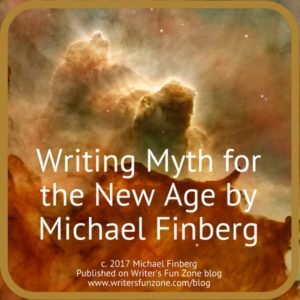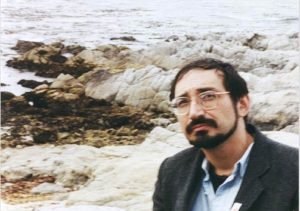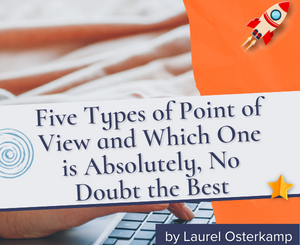Writing Myth for the Ages by Michael Finberg
 Let’s welcome back Michael Finberg as he shares with us “Writing Myth for the Ages.” Enjoy!
Let’s welcome back Michael Finberg as he shares with us “Writing Myth for the Ages.” Enjoy!
***
When most people think of myth — if they think about it at all — conjure up images of Greek gods fighting it out in skimpy clothes. Or perhaps, they might remember a school lecture about dragons and unicorns. To many people, myth may seem remote and irrelevant.
Yet myths are deeply rooted in the human mind.
Why?
Because myths hints at a bigger reality beyond the natural and human world. A bigger reality based in our minds.
Ancient people in pre-industrial times believed in an inner world filled with powerful psychic forces and entities that influenced them and the nature surrounding them.
Today, we live in times of massive change. Our species is being catapulted towards a civilization both disruptive and global. Digital media is shrinking our planet. We are being sucked into a paradox.
Our media is creating a planetary movie even as our minds are increasingly becoming fragmented.
Myth can be a great tool for writers because it can heal the split this paradox is generating. Myth can unite the global and local human psyche.
The mythic Hero’s Journey popularized by Joseph Campbell is a life map that illustrates how we can heal this global and local split. The Hero’s Journey describes going on a physical journey filled with challenges and obstacles that force the traveler to also go on a parallel inner journey which ultimately plugs into a bigger reality.
Myth fuses the traveler’s outer life with this bigger interior reality.
A reality that harbors huge psychic resources that can help the seeker deal with life’s constant outer challenges. The traveler soon discovers that the human mind and this bigger reality can contain infinite layers.
A writer exploring these endless layers has an opportunity to create some powerful stories.
By exploring a deeper inner universe, myths show us how individuals grow by performing the “right” spiritual action when confronted with difficult choices.
By making these choices, good or bad, the individual helps determine what kind of society is ultimately created.
You can’t find a bigger story form than myth. Future myths when fused with modern story genres will transform these local stories into epic ones.
Epic myths are big picture stories that guide and program civilizations. They give civilizations and the individuals in them a crucial identity about how to behave and treat other people.
Creating new myths can be exciting and scary.
Epic myths are like cultural software.
The old myths were jam-packed with symbols for both personal and social growth.
Like the old myths, today’s mythic writer can also provide the reader with symbols that point toward a new vision of where society may be going. A vision filled with new cultural values and psychological tools which are necessary for future spiritual growth on both individual and global scales. That’s a powerful combination.
In our past, myth reflected how civilizations organized themselves and these myths ceaselessly evolved. In Europe pagan cultures their myths revolved around warrior values reflected in stories about gods and how they fought. These pagan myths clashed with new myths coming out of the Middle East. Jewish and Christian myths about a single God ultimately uniting bigger groups of people.
In America, the Christian of a new sacred civilization inspired European warriors to create a new world that would reshape nature and the indigenous inhabitants who occupied it. The European knight evolved and became the cowboy. The inner universe of the cowboy became the new American. The cowboy ultimately was replaced by new warriors in America’s industrial cities. The gangster, the cop, and the detective became the new mythic heroes.
In 1977 Star Wars became the first popular film to be consciously seen as a mythic work. Science fiction became the new arena for myth. The old mythic concept of a spiritual seeker receiving mentorship from a wise teacher became modernized. Obi-wan Kenobi and Yoda became modern mythic teachers for the high-tech mythic hero Luke Skywalker. Lucas went one step further by creating the idea of The Force. The cosmic glue which held everything in the universe together. All myths have a higher power that unites not just the story characters, but the writer and audience, as well.
Cosmic Glue
Writers today have a huge opportunity to explore this cosmic glue concept in the form of old myths mixed with modern story genres. These genres will modernize and ground the ancient myth maps.
At our deepest core our minds are pretty much like ancient ones, but we live in a planetary and fragmented digital environment—a world that’s confusing and disruptive. Myths can psychologically heal and unify our minds by transcending both local and global mind-frames.
Today’s writers must become myth-makers who can unify our global society by telling personal inner stories within a bigger universal context. It’s a big challenge and responsibility.
In past stories, this inner expansion was dramatized by characters going on an epic physical journey. Some writers can still do this. I certainly made an epic global trek with my book Harvest of Gems, but the mythic journey can also be more psychological while staying in a more local space. You can be Harry Potter and do your inner journey at Hogwarts. You can make this inner journey in any mundane place by making it fantastic. There is no need to fly all over the galaxy like Luke Skywalker.
But you can do that too in your own story. It’s the writer’s choice, but whatever you do, the more you share your mythic story with a wider global audience, the more it will be a key influence for future readers.
Our species today is in transition. Since ancient days humans have loved a good fight between good guys and bad guys. It’s part of our cultural software. But future myths will also involve searching for deeper truths instead of just constant fighting. Future myth stories will involve a group as well as the individual. Future myths will show a group journey evolving into a mini-society.
There will be a lead character, but he or she will need plenty of help solving bigger global problems like climate change and species extinction. It will be incredibly entertaining too. The new myth will be about bigger social systems and how both individuals and groups navigate and evolve inside these bigger systems.
Does this sound challenging?
It certainly is.
The new myth writer can balance this bigger story with rich details describing the evolving society the group is embedded in. Adding one-on-one drama makes the story personal and less abstract. This is how ancient myth will take a new modern form as it quietly works underneath your story.
A key element that will do the heavy emotional lifting for your reader will be the mix of genres you the writer choose. The new myth will be a family affair. It will be an epic systems story. It will ask the big evolutionary questions like the movie 2001, but be far less alienating.
It should be a lot of fun.
The story characters will evolve together with the new society they are creating and a new myth map will emerge that will guide future generations of readers toward a braver new world.
In our next article we will explore some possible myth templates for the future.
***
ABOUT THE AUTHOR
 Michael Finberg began writing when he was ten years old. After graduating from UC Berkeley in 1984, Michael went to Tibet. In 1990, he dropped out of society after a lucrative career in the financial markets. The result of his ten-year pilgrimage was a ton of poetry and two novels: Harvest of Gems and The Little Monk. Michael is currently working on Zone Girl, a dream fantasy series. The first installment should be completed by 2019. His website is http://www.spiritualscififest.com.
Michael Finberg began writing when he was ten years old. After graduating from UC Berkeley in 1984, Michael went to Tibet. In 1990, he dropped out of society after a lucrative career in the financial markets. The result of his ten-year pilgrimage was a ton of poetry and two novels: Harvest of Gems and The Little Monk. Michael is currently working on Zone Girl, a dream fantasy series. The first installment should be completed by 2019. His website is http://www.spiritualscififest.com.







This is a profound–and profoundly helpful–post. Thank you. I wonder if any recent works reflect the lessons you teach here. For example, is there anything mythic about “Breaking Bad” or “Mad Men”? Are there any very recent movies, TV shows, or books that serve as models for new mythic writing?
Mad Men is a good outlier for this kind of systems journey where an entire society evolves.
Game of Thrones and Downton Abbey are other good examples.
Breaking Bad is still technically a hero’s journey, but an inverse one where lessons are not learned and the hero has a downfall.